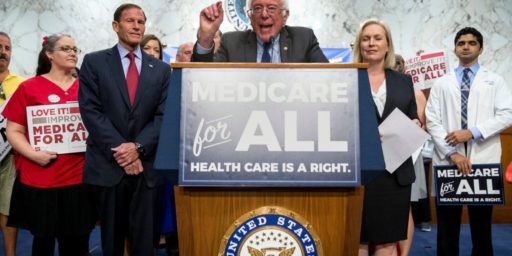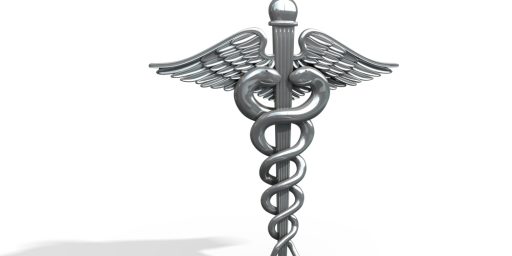SCHIP Veto Sustained
President Bush got another victory today, as Congress was unable to override his veto of a massive, costly expansion of SCHIP.
House Democrats were unable Thursday to override President Bush’s veto of their pre-election year effort to expand a popular government health insurance program to cover 10 million children. The bill had bipartisan support but the 273-156 roll call was 13 votes short of the two-thirds that majority supporters needed to enact the bill into law over Bush’s objections. The bill had passed the Senate with a veto-proof margin.
The State Children’s Health Insurance Program now subsidizes health care insurance coverage for about 6 million children at a cost of about $5 billion a year. The vetoed bill would have added 4 million more children, most of them from low-income families, to the program at an added cost of $7 billion annually.
[…]
Republican opponents said the bill would encourage too many middle-income families to substitute government-subsidized insurance for their private insurance. The bill gives states financial incentives to cover families with incomes up to three times the federal poverty level — $61,950 for a family of four. “That’s not low-income. That’s a majority of households in America,” said Rep. Wally Herger, R-Calif.
Providing health care for kids is politically popular, as evidenced by the bipartisan support for the bill in Congress. Then again, Bush isn’t running for re-election. Regardless, the end result will be a compromise that will almost certainly still somewhat expand the program.
The math on this is rather odd. We’re currently spending $5 billion to cover 6 million kids, or $833 per kid. The bill would have added another 4 million kids at $7 billion, or $1750 per kid. Granted that the unit costs are likely to increase somewhat in the future but shouldn’t the incremental cost still go down rather than up?






Doesn’t Iraq cost $5 billion a month (just currrent costs – not to include long term wear and tear on vehicles and equipment). This bill seems like a drop in the bucket – or is this not about money but rather about not expanding the gov’t like w/ the prescription drug plan…
Mostly the latter, I think. Plus, there’s serious argument to be made here that most of the expansion is to middle class families, who certainly shouldn’t need subsidized health care to take care of their kids absent extraordinary circumstances.
Like getting any sort of serious illness.
Do you honestly think that a family earning 45,000 a year can afford $12,000 for medical insurance? (And that’s probably a lowball given any sort of pre-existing condition.)
Most families making that kind of salary have health insurance, no? Certainly, that’s more than I was making as a college professor five years ago and my colleagues with families managed to feed, clothe, and insure their kids.
Did your colleagues have employer paid insurance or did they pay the full cost out of pocket?
I think Andy is having a hard time figuring out how insurance works.
I’m guessing the former.
As would I. That was the point.
His colleagues were most likely able to insure their children on a 45K salary because they did not have to pay for the bulk of that insurance.
You might want to expand your worldview beyond your personal experience. What about a family of 4 with 2 working parents both making approx 25k, but with few or no benefits. What’s your position? Screw them, screw their kids?
Are we honestly going to pretend that most people that make 45K are not getting insurance through their employers? If you make over 50% of the population eligible for coverage, then no one is going to get insurance through their employer when the government can foot the bill instead. And so to help that minority of the middle class who does not get heath insurance through their employer, are we going to put everyone on the government teat?
I didn’t say it was a single person making $45k. Maybe most jobs at that salary range do offer health benefits (but not all, certainly).
I said FAMILY. And a family earning $45k is usually two jobs in the low 20’s, where good benefits are not necessarily common. And a family making $45k is exactly the range for the SCHIP program (about what the Frosts make).
Once again, we see the inherent bias in people with decent jobs and good benefits who simply can’t understand that other folks are not as fortunate.
Oh, really? I think it’s clear that you’ve never had to get insurance on your own for a whole family where someone has a serious preexisting condition. Clearly, Steve Verdon would rather have such a lower middle class family lose their home and live in poverty than be able to accept a government benefit.
My employer pays for 60% of _my_ insurance premium, I have to cover 100% of the premium for the rest of my family of 4. It costs me roughly $1000/month, so Andy’s estimate is pretty accurate for my case. For many people, that is more than the monthly cost of housing (rent or mortgage).
In my particulate case, with an ASD child, I was paying an additional $800/month for various therapies that insurance wouldn’t cover, or would only cover a small amount. So that’s close to $2000/month in medical expenses alone, or $24,000/year, so yeah, if I was making $45,000/year I’d be screwed.
Even at the 3x poverty level, that’s 1/3 of household income going to medical care for families _with_ insurance.
Perhaps an income of 45k for a family of 4 seems like major money to John G, but where I live, it represents a constant struggle, and in the long run, a loosing one, just to make it.
The GOP has made its position very clear. We are “pro life”; we just don’t give a crap about the children once they are born.
Doesn’t Iraq cost $5 billion a month (just currrent costs – not to include long term wear and tear on vehicles and equipment). This bill seems like a drop in the bucket – or is this not about money but rather about not expanding the gov’t like w/ the prescription drug plan…
One difference is that at some point Iraq will stop costing $5 billion a month. It isn’t an entitlement program.
SCHIP is an entitlement program, and once they expand it into the middle class, the entitlement will be permanently with us, because there isn’t an entitlement program yet that was scaled back or cut, so that “drop in the bucket” in the end is going to cost more money, because no entitlement program ever cost what it was predicted to, they always end up more expensive, and they only get more expensive.
Most families making that kind of salary have health insurance, no?
I would probably say they don’t. For one thing a lot of people in that income bracket are self employed, and they don’t have any portion of their insurance covered. I work with several people who work for no paycheck (my job covers the employees benefits at almost 100%, but all family coverage is 100% paid for by the employee, so family coverage is about $600 every two weeks), because their husbands are self employed, and this is how they get insurance for their families. One of my coworkers would clear about $20 or so dollars per pay period, because all of her salary was going towards medical insurance.
Also, as was already said, some of those families may be making 40k, but it could be two incomes at low skill jobs, which may come with benefits, but they are often expensive. When my husband worked at a grocery store while finishing college we had to contribute about $500 a month towards our insurance (they covered either 60% or 40% I can’t remember which was their share and which was ours), which may seem doable, but a lot of people working at those jobs, are working for $6-8 an hour, and that is a huge chunk of their pay.
I am not convinced the answer to these problems is government provided healthcare like SCHIP, I would like to see healthcare divorced from employment, and I would like to see more ability for the self employed to pool together and contract/negotiate for cheaper insurance much like large companies can do.
Will supporters of SCHIP expansion stop lying?
It was 85 not 45 thousand the threshold for it was going up to. And up to age 25.
And I worked for a benefits administrator. People making 60 thousand didn’t want to pay 80 dollars a month for their coverage.
And if you honestly believe that family only makes 45 thousnad you are the world’s dumbest person.
And about those people going into debt over bills?
I worked in health care collections (not as a collector a data entry clerk) and saw the credit histories.
Amazing how many people are working for big companies meaning you know they had insurance available that didn’t want to pay for health insurance but had 10,000 dollars of charges at Best Buy or the like.
Well, you’re not quite in touch with the facts yourself, and you expose yourself as a Malkinite true believer with the statement that the Frosts (whom I assume you are referring to) are secretly wealthy.
Even Sen. Grassley has called out the White House for lying about the $83,000 figure. The cap was to be expanded to around $63,000.
I agree in principle, but I don’t think that these things can happen without significant health system reforms that would be rather more painful and costly than a reasonable expansion to SCHIP.